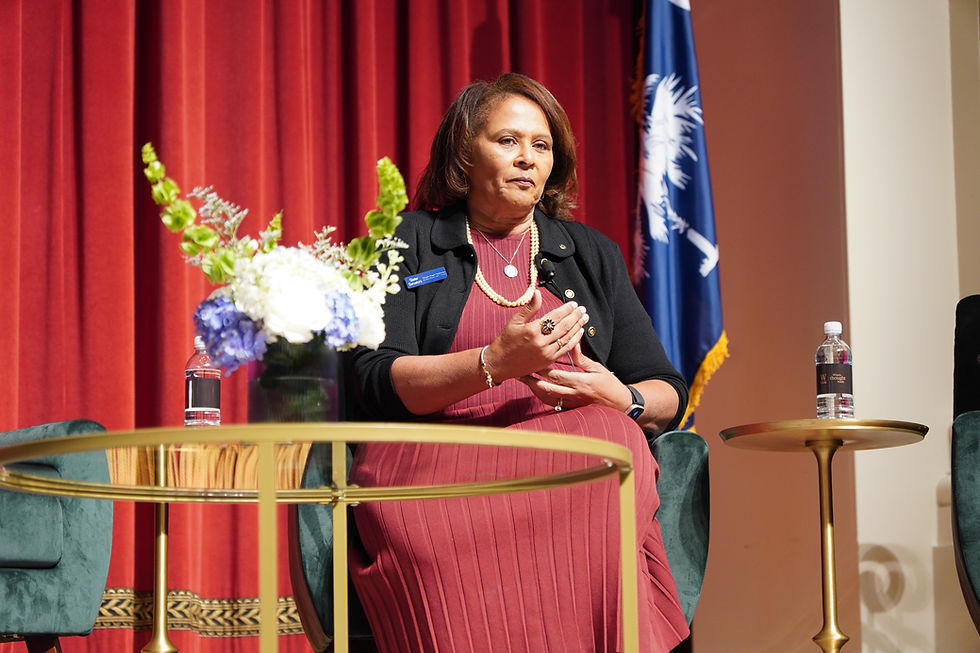Richland County Moves to Dismiss Word of God CDC Lawsuit in Frivolous Federal Filing
- CUBNSC

- Nov 2, 2025
- 4 min read

By Javar Juarez | Columbia Urban Broadcast Network (CUBN) | November 2, 2025
The Word of God Community Development Corporation (WOG CDC), led by Bishop Eric Davis, is taking Richland County to federal court over what it calls years of discrimination, obstruction, and retaliation by county officials against a Black-led faith-based development organization. At the center of the dispute is the Dutch Square Mall redevelopment project—a bold plan by WOG CDC to transform the aging retail property into a mixed-use community hub featuring affordable housing, educational space, and small business incubation for local residents.
Instead of embracing this vision of equitable progress, the County allegedly used zoning maneuvers, bureaucratic delays, and shifting requirements to undermine the project’s success. The lawsuit, filed in late September, accuses the County of violating the First and Fourteenth Amendments—including the rights to free exercise of religion, equal protection, and free speech—by systematically blocking a project that would have brought jobs, investment, and hope to one of Columbia’s most underserved corridors.
At its core, the case asks a simple question: why does a county that claims to support equity and growth seem to stand in the way when that growth comes from a Black church?
Instead of answering that question, Richland County has chosen to fight the format, not the facts.
On October 29, the County filed a 17-page motion in federal court asking that WOG CDC and its partners—Word of God Church & Ministries International, WOG LLC, and Bishop Davis—have their case dismissed, or at the very least be forced to rewrite it.

On paper, the filing looks impressive. But once examined, it’s clear: the County isn’t defending justice; it’s defending itself from scrutiny.
This is not a legitimate defense. It’s a legal stall tactic—a procedural smokescreen designed to exhaust the plaintiffs and avoid a discussion of facts that the community deserves to see in daylight.
Richland County: A Motion to Dismiss Built on Paper, Not Principle
In its October 29, 2025 memorandum, Richland County’s legal counsel doesn’t attempt to refute the substance of WOG’s claims. Instead, it attacks how the complaint is written. The County’s argument? That the plaintiffs’ 49-page filing is “too long,” “not concise,” and therefore violates “Rule 8” of the Federal Rules of Civil Procedure.
In essence, the County’s lawyers want the court to ignore alleged violations of constitutional rights because the complaint includes too much evidence.
They call it a “shotgun pleading.” Most residents would call it something else: thorough.
When a public body is accused of discrimination, unequal treatment, or retaliation, the community deserves the whole story, not a soundbite. The Word of God CDC’s lawsuit lays out years of documented correspondence, council decisions, and patterns of exclusion that show how power in Richland County has been selectively exercised. The complaint is detailed because the history is complicated—and because justice, when buried, demands a careful excavation.
Deflection Instead of Defense

What makes the County’s motion particularly hollow is that it never denies the central allegation: that Richland County Council and its officials have used zoning, funding, and administrative power in ways that undermine faith-based and minority-led development initiatives.
Instead of accountability, we get technical theater. The County argues that:
Officials can’t be sued collectively because it’s “unclear who did what.”
Council-members can’t conspire because they all work for the same entity.
The County Council “can’t be sued” because it’s technically part of Richland County.
In plain English: the County is telling the court that no one is individually responsible, and that collectively, they can’t be held responsible either.
That’s not law—it’s bureaucratic gymnastics.
The “intracorporate immunity” doctrine they cite was never meant to shield government officials acting in bad faith. Courts have repeatedly carved out exceptions when public servants use their office to discriminate, retaliate, or obstruct equal access. But rather than face the moral question of whether such behavior occurred, the County is hiding behind legal wordplay.
What the County’s Filing Reveals About Power
Richland County’s motion says a lot about how local institutions respond when challenged by organized Black leadership. Instead of collaboration, we see law-fare—the use of procedural weapons to punish those who refuse to stay silent.
The County’s 17-page filing, littered with citations and courtroom jargon, attempts to paint WOG’s complaint as burdensome. Yet, what truly burdens the public is a government that resists transparency. Every hour spent on a frivolous motion is an hour not spent addressing community needs, economic disparities, or the spiritual and social renewal that organizations like WOG CDC champion.
This case isn’t about formatting—it’s about fairness.
The Larger Message
The lawsuit filed by Word of God CDC and its partners is part of a larger struggle in Richland County: a struggle over who gets to build, who gets to lead, and who gets to decide the future of development in communities of faith and color.
When those in power respond not with dialogue but with dismissals, they reveal their fear of public examination. They want control over the process, the narrative, and even the language of accountability.
But South Carolina’s courts don’t belong to politicians—they belong to the people.
The County’s filing, built on form rather than fact, is an insult to the intelligence of residents who can clearly see what’s happening. The plaintiffs aren’t just seeking relief—they’re exposing a pattern of bureaucratic obstruction that has crippled equitable growth along the Broad River Corridor for years.
A Community That Refuses to Be Silenced
Word of God CDC’s case deserves its day in court. It deserves discovery, evidence, and testimony—not dismissal by technicality.
If the County truly believes it acted lawfully, it should welcome transparency, not hide behind procedural fog. The motion to dismiss is not a shield of innocence; it’s a signal of fear.
And the people of Richland County deserve far better than leaders who weaponize process to silence progress.



Comments